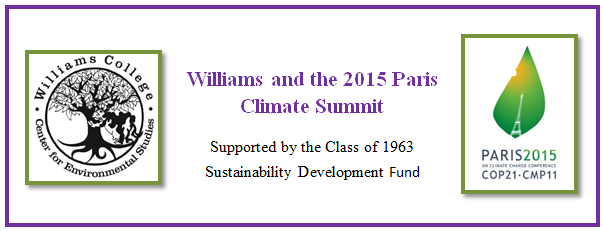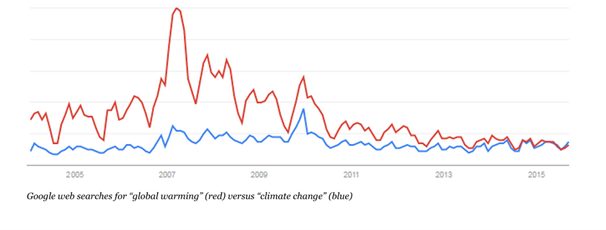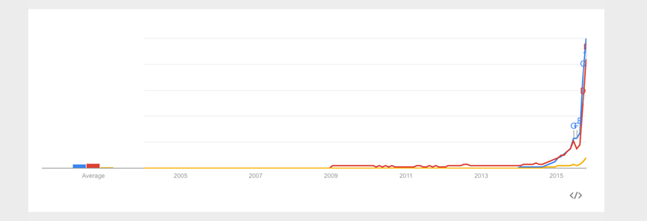By Sarah Ladouceur, Class of 2018
What’s Up with the Media Coverage of Climate Change?
The media is an important player in climate change communication – the general population does not read scientific reports, specialist websites and blogs, or the reports of the IPCC. Although in theory, the ‘facts’ of climate change science should be reported in a straightforward way by newspapers and television networks, considerable differences exist between the editorial lines taken by different media organizations about the reality and seriousness of climate change. Perhaps unsurprisingly, there is a strong relationship between the political perspective of a media organization and its position on climate change. The website of the left-leaning UK newspaper the Guardian, for example, is known internationally as a hub of climate change and environmental reporting and opinion – and skeptical opinions are rarely to be found. In comparison, right leaning media (such as the US Wall Street Journal) are far more likely to carry skeptical opinion and editorials. Although it is difficult to establish cause and effect, it seems highly likely that the position of right and left-leaning media is one of the key influences on public perceptions (which display a similar split along ideological lines), and media-generated controversy is also often cited as a reason for skepticism about climate change. But interestingly, media ‘exaggeration’ of climate change is also one of the measures that has been used to indicate skepticism in public attitudes – so there is a complex relationship between public perceptions and media reporting of climate change.
It has been a busy month for climate change issues. In his first visit to the United States, Pope Francis chose to make climate change a central tenet of his trip, speaking about it more than any other topic in his address on the White House lawn, emphasizing it in his United Nations speech, and choosing it as his single call to action when speaking before Congress. China announced a new cap-and-trade emissions reduction program. All of this comes on the heels of President Obama’s trip several weeks ago emphasizing the impact of climate change on the Artic. (This post does not take into account the tragic terror attacks in Paris that took place on November 13th, 2015. This is because all analysis took place before the event.) What can the world of data tell us about the current state of public interest in climate change as an issue and how the world’s media is covering the topic across the planet?
Who Cares?
The first major question that needs to be addressed is whether the public is actually interested in climate change. Google web searches show that the countries searching most frequently on the topic tend to be those most affected by changing climatic conditions: Fiji, Philippines, Mauritius, India, South Africa, Trinidad & Tobago, Jamaica, Ethiopia, Malawi, Nepal, Zimbabwe, Zambia, and Uganda. (Google Trends, 2015) This suggests that being affected by the phenomena increases public interest: it is not wealthy countries idly researching a topic they hear on the news, it is affected populations trying to understand more about what they are experiencing. Looking at how search interest has changed over time, the timeline below shows that “global warming” has historically been the term of choice used by the public when searching on the topic, while “climate change” has been the preferred term of academics and policymakers and thus less searched on. The below graph shows the trends in google searches of the terms “global warming” and “climate change”.
What about COP21?
When the attention is turned to more specific climate change events the results are extremely different. The below graph shows the searches for the terms “COP21” (blue), “COP 21” (red) and “Paris Climate Conference” (yellow).
(Google Trends, 2015)
In addition to the limited search history of these terms, it is also surprising to find that the majority of the searches were done in France, the United States and Japan. (Google Trends, 2015)
For the general public, access to news about this event is limited to what pops up on the home screen of whatever news site they choose to look at. On a columnist’s environmental page, CNN ran a piece called “100 Days to Save the World” on September 11th, 2015 that attempted to break down the COP21 conference and explain why people should be optimistic about the outcome. In a classic climate change coverage strategic move, the first thing the reader sees when opening the article is a polar bear with her two cubs on melting ice. (Sutter, 2015) Other than this article, no other articles about COP21 appear in the ‘related articles’ bar, and there seem to be no other articles purely about COP21 in CNN’s ‘twoo’ environmental section of the website. Instead, articles about climate change are relatively limited and very scientific in their writing. The most user-friendly article seemed to be a quiz about climate change as seen below.
When looking for COP21 articles on other sites, such as BBC, The New York Times and the Washington Post, the results are even more limited. When searching the term COP21 on all the sites the results are all articles about other things that mention COP21 because it is somehow related. There is nothing explaining COP21, the important players, key things to know in advance etc. It is clear that the necessary place to look for information about the conference are environmentally specific sites and the COP21 site itself. Sites such as ICE CaPs (International Collective on Environment, Culture and Politics), The Guardian and the UNFCCC website have all devoted far more resources to COP21 and attempting to make it more accessible.
What Does It All Mean?
What is the result of this though? The average person on the street is not going to take the time to look for a lesser known news source or even to scour their usual source in order to find more information about something that very few people are pushing as important. Media coverage is extremely influential in people’s view of how important an issue is so without coverage COP21 is missed by the vast majority of citizens.
In recent decades there has been a push to research and, subsequently, criticize media coverage of climate change. This stems from a belief that the media should serve more as a watchdog of the issue- reporting things as they are, without political biases. Recent research has concluded that mass media is a critical agent in the way that climate change issues are framed in public opinion. This prompts several questions: what is the role of news media (watchdog or otherwise) and how much power do they possess? Where in the process of news — which begins with competing claims-makers who seek to instigate and influence news, culminates with the story presented to the public and concludes with media audiences — does the power of media lie? And in whose interest do news media operate — is it in the public’s interest as a watchdog or for other interests altogether?
Sources of Interest:
- http://sciencepolicy.colorado.edu/icecaps/research/media_coverage/index.html
- https://twitter.com/search?q=COP21&ref_src=twsrc%5Egoogle%7Ctwcamp%5Eserp%7Ctwgr%5Esearch
- http://unfccc.int/meetings/paris_nov_2015/meeting/8926.php
Bibliography
Google. “Trend Comparison.” Google Trends. Accessed October 30, 2015. http://www.google.com/trends/explore#q=global%20warming%2C%20climate%20change%2C%20COP21%2C%20COP%2021%2C%20Paris%20Climate%20Conference%22&cmpt=q&tz=Etc%2FGMT-10.
———. “Trend Comparison.” Google Trends. Accessed October 30, 2015. http://www.google.com/trends/explore#q=global%20warming%2C%20climate%20change%2C%20COP21%2C%20COP%2021%2C%20Paris%20Climate%20Conference%22&cmpt=q&tz=Etc%2FGMT-10.
———. “Trend Comparison.” Google Trends. Accessed October 30, 2015. http://www.google.com/trends/explore#q=COP21%2C%20COP%2021%2C%20Paris%20Climate%20Conference%22&cmpt=q&tz=Etc%2FGMT-10.
Leetaru, Kalev. “What Data Tells Us about Public Interest in Climate Change and Its Global News Coverage.” Forbes. Last modified September 26, 2015. Accessed October 30, 2015. http://www.forbes.com/sites/kalevleetaru/2015/09/26/what-data-tells-us-about-public-interest-in-climate-change-and-its-global-news-coverage/.
Sutter, John D. “100 Days to Save the World.” CNN. Last modified September 11, 2015. Accessed October 30, 2015. http://www.cnn.com/2015/08/21/opinions/sutter-climate-paris-two-degrees-100-days/index.html.



